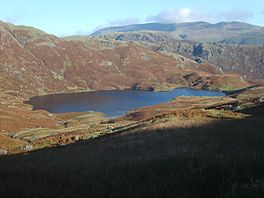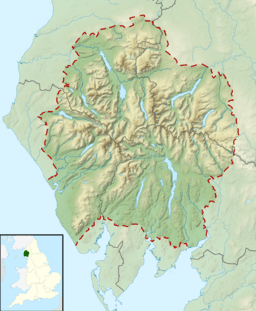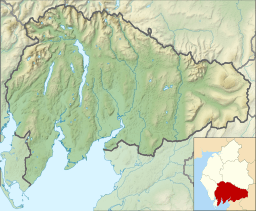Easedale Tarn facts for kids
Quick facts for kids Easedale Tarn |
|
|---|---|

Easedale Tarn as seen on the ascent of Blea Rigg, Helvellyn is seen in the background.
|
|
| Location | Lake District, United Kingdom |
| Coordinates | 54°28′10″N 3°04′11″W / 54.4695°N 3.0696°W |
| Type | tarn |
| Primary outflows | Sourmilk Gill |
| Max. length | 480 metres (1,570 ft) |
| Max. width | 300 metres (980 ft) |
Easedale Tarn is a beautiful small lake, or "tarn," found in the heart of England's famous Lake District. It's located about two miles west of a charming village called Grasmere. This peaceful tarn sits in a natural bowl, surrounded by hills like Tarn Crag to the north and Blea Rigg to the south. It's about 280 meters (910 feet) above sea level.
Contents
Easedale Tarn: A Lake District Gem
Easedale Tarn is nestled in the Lake District, a stunning national park in the United Kingdom. It's easy to find, just a short distance from the popular village of Grasmere. The tarn is surrounded by beautiful fells (hills), making it a perfect spot for exploring nature.
How Was Easedale Tarn Formed?
This lovely tarn was created by a special type of glacier called a "corrie glacier." Imagine a giant scoop of ice carving out a bowl in the mountains! This happened many thousands of years ago. Around 11,000 years ago, when the ice finally melted, the bowl filled with water, forming Easedale Tarn.
What Makes Easedale Tarn Special?
Easedale Tarn is one of the larger tarns in the Lake District. It stretches about 480 meters (1,575 feet) long and 300 meters (984 feet) wide. The water from the tarn flows out through a stream called Sourmilk Gill. This stream gets its name from the milky white color of its waterfalls. You can see these impressive waterfalls from Grasmere and from the path leading up to the tarn.
A Popular Spot for Walkers
Easedale Tarn is a very popular place for people who enjoy walking and hiking. Many visitors climb the path from Grasmere, which offers amazing views of Sourmilk Gill. This walk has been popular for a long time, even back in the Victorian period.
In the 1800s, a man named Robert Hayton even set up a small hut near the tarn's outlet. He sold refreshments to the thirsty walkers who made the climb. That hut is no longer there, but the beautiful scenery still attracts many people today.
 | Shirley Ann Jackson |
 | Garett Morgan |
 | J. Ernest Wilkins Jr. |
 | Elijah McCoy |



